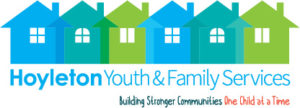United Church of Christ’s Hoyleton Youth and Family Services works to prevent child sex trafficking

Kristen Eng
Groomed, flattered, tricked. Violated. Children as young as 8, as old as 17, often are easy marks for child sex and/or labor traffickers in the United States. And once trapped, the children can’t escape without help.
In Illinois, United Church of Christ-related Hoyleton Youth and Family Services works with community and federal partners to help increase awareness and prevention of child trafficking. Begun in 2011, the anti-trafficking program started as part of Hoyleton’s Puentes de Esperanza, which works with Latinx families and individual in southern Illinois.
“At the time, we believed the likelihood of individuals being trafficked and exploited would be within the foreign-born population,” says Kristen Eng, Hoyleton’s prevention supervisor.
But Eng and others quickly found that was not the case. “As our program developed,” she says, “we began to identify more cases of sex trafficking among youth. As the program stands today, we do preventative work with both sex and labor trafficking, but we have an emphasis on sex trafficking and exploitation among youth.”
According to the U.S. State Department, more 244,000 U.S. children and youth are at risk for sex trafficking each year. Additionally, the National Human Trafficking Hotline received 150 reports of child labor trafficking in the United States in 2016 alone. Both numbers may be underreported.
 The Hoyleton program focuses on providing training presentations to law enforcement, investigators and caseworkers with the Illinois Department of Children and Family Services (DCFS), mental health providers, first responders, and community members. The goal is to increase awareness and help people identify victims and survivors of trafficking.
The Hoyleton program focuses on providing training presentations to law enforcement, investigators and caseworkers with the Illinois Department of Children and Family Services (DCFS), mental health providers, first responders, and community members. The goal is to increase awareness and help people identify victims and survivors of trafficking.
Presentations often include survivors sharing their stories. In 2015, for example, the CHHSM-member ministry held a glow run for National Crime Victims’ Rights Week. During the event, two child sex trafficking survivors spoke to attendees about their experiences. The program also assists the Springfield FBI with “Operation Cross Country,” which helps recovers minors who have been exploited.
The anti-trafficking program works with at-risk youth, too, through a prevention curriculum that “focuses on empowering youth through various discussions and videos,” Eng says. “This curriculum addresses not only trafficking, but also the factors that lead to exploitation of youth.”
The success of the program is thanks to community partners across Illinois, Eng says, including the DCFS, FBI, U.S. Attorney’s Office, child advocacy centers, and many other local, regional, and national violence prevention and community- or church-based groups.
“DCFS is one of our major funders for the program,” she says, but she emphasizes that the program would not be possible without the support of all of Hoyleton’s partners.
“Our community partners have worked with us for a number of years to provide referrals for presentations, outreach efforts in the community,” she adds, “and/or as collaborators for individual cases.”
Since its inception, Hoyleton’s anti-trafficking program has garnered high praise for its tireless efforts. This past August, the program was recognized by Illinois State Senator Karen McConnaughay, who noted that the program “has become well known … as a resource for issues involving victims and survivors of human trafficking.” Hoyleton also was recognized in 2015 by the entire Illinois State Senate.
Eng says she hopes to expand the program to include direct services for victims and survivors. For now, connecting victims and survivors to services, and collaborating with survivors to advocate and provide training to thousands of individuals throughout southern and central Illinois, are successful building blocks for the future.
Says Eng, “Every individual we educate is one more person who can help combat trafficking.”
Kristen Eng discusses Hoyleton’s work to prevent child trafficking in this video.
Join Our Mailing LIst
Follow on Facebook
Iredell Adult Day Services Hosts Ribbon-Cutting to Celebrate Adult Day Health Certification - CHHSM
www.chhsm.org
Iredell Adult Day Services (IADS) in Newton, N.C. — a nonprofit organization dedicated to caring for older adults, vulnerable groups, and their families, and part of EveryAge — hosted a ribbon cut...